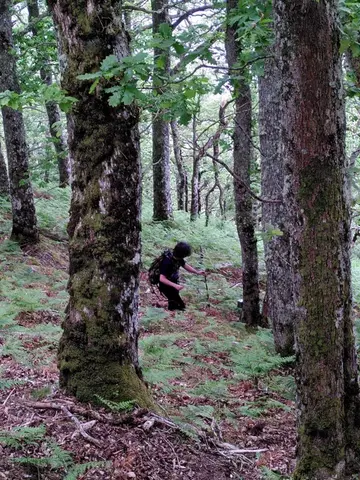
Ecosystem processes
Institute of Zoology
Zoological Society of London
London
NW1 4RY
Connor’s research aims to strengthen our understanding of the ecological processes occurring on rewilding sites.
Although a precise definition is still debated, rewilding generally refers to the nature-led reorganisation of ecosystem processes with minimal ongoing human intervention. Rewilding contrasts with traditional nature conservation by emphasizing ecosystem processes (like grazing and rooting) over species composition, an increasing acceptance of new ecosystems and ecological communities, and a ‘hands-off’, nature-led approach. Over 80 rewilding sites are now registered by ‘Rewilding Europe’, with all expected to demonstrate increased biodiversity, changes to ecosystem processes, and improved ecosystem service delivery: including increased carbon storage. Proponents of rewilding suggest that it acts as a key tool to combat both biodiversity loss and the climate crisis.
Despite the above claims and a significant growth in interest in rewilding since its initial formal conceptualisation in 1998, there is a lack of empirical and experimental studies assessing or analysing the processes occurring in, and the consequences of, rewilding. Instead, a bias towards essays and opinion pieces is observed in the literature. This bias inhibits the development of scientifically robust rewilding practices and, through the acceptance of untested dogma and practices, can lead to adverse and unexpected social-ecological problems.

Connor’s focus is on rewilding in Scotland, and he works with Highlands Rewilding Ltd on their Bunloit rewilding project to assess the behaviours, activities, and social-ecological impacts of their keystone wild ungulate species: the red deer, roe deer, sika deer, and wild boar. He further hopes to assess the synergies and trade-offs occurring between different ecosystem services and processes on the rewilding site, such as between biodiversity and carbon storage. This research aims to help rewilding practitioners better understand the ecological processes occurring on their rewilding sites, which will help to better anticipate the trajectory of rewilding and potential conflicts and problems; both ecological and societal.
2021-Present: PhD researcher, London NERC DTP, Institute of Zoology and King’s College London
2021: Great Crested Newt Technical Officer, NatureSpace
2019-2020: MRes Ecology, Evolution and Conservation Research, Imperial College London
2019: Assistant Ecologist, Thomson Environmental Consultants
2015-2018: BA Natural Sciences, Selwyn College, University of Cambridge
Lovell, C., Pettorelli, N., & Dawson, T. P. (2024). Land cover preferences and spatiotemporal associations of ungulates within a Scottish mammal community. Ecology and Evolution, 14(2), e11015. https://doi.org/10.1002/ece3.11015
Lovell, C., Li, S., Turner, J., & Carbone, C. (2022). The effect of habitat and human disturbance on the spatiotemporal activity of two urban carnivores: The results of an intensive camera trap study. Ecology and Evolution, 12, e8746. https://doi.org/10.1002/ece3.8746
Lovell, C. & Middleton, S. (2023). Thrushes. In Coleman, D., Middleton, S., & Woodward, I (Eds.), London Bird Report 2021. London Natural History Society.
Wyn-Jones, H. & Lovell, C. (2022). Thrushes. In Coleman, D., Middleton, S., & Woodward, I (Eds.), London Bird Report 2020. London Natural History Society.
Wyn-Jones, H., Middleton, S. & Lovell, C. (2021). Thrushes. In Coleman, D., Middleton, S., & Woodward, I (Eds.), London Bird Report 2019. London Natural History Society.
